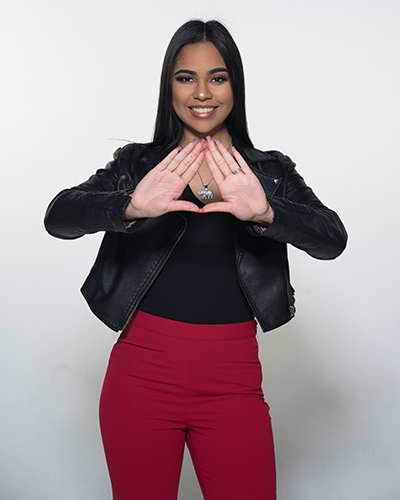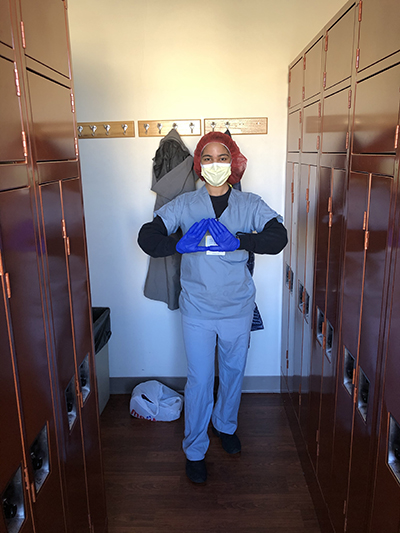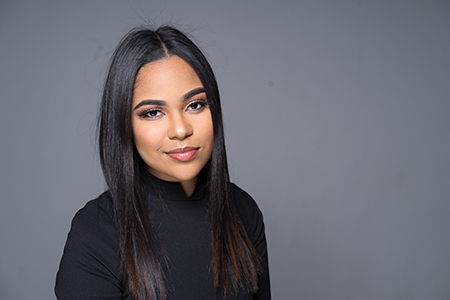“I haven’t cried…yet,” says Deaja Todd, a wan smile struggling across her face.
Not that anyone would blame the 22-year-old — who plans to complete her bachelor’s program in public health at Wayne State University this winter — if she did break down in sobs. A nursing assistant who works three days a week on one of several floors set aside by a local hospital system for Detroit-area COVID-19 patients, Todd has been as close to the front lines of the pandemic as any aspiring health professional could imagine.

She’s witnessed the fear on the faces of her colleagues and mentors, hardened medical professionals with decades of experience, as they fight to save dying patients while also trying to avoid contracting the infection themselves. She’s felt the sadness and anger they’ve expressed at their inability to stop a disease that they still know too little about. And she’s seen death — way too much of it.
“We’ve had people pass away, and it’s very sad,” says Todd. “Sometimes, it happens so suddenly. We’ve had people come in who look fine. One minute, they’re talking and texting on their phones. And then, all of sudden, they’re fighting for their lives.”
Through it all, Todd keeps working. An aspiring nurse with plans to enroll in WSU’s College of Nursing after graduation, Todd works 12-hour days to provide crucial support to the health care professionals around her. She makes runs for materials for overwhelmed doctors and nurses. She stocks medical carts with critical equipment. She carefully helps staff members into and out of protective gowns. She endlessly sanitizes doorknobs, entryways and just about anything else that could pose an infection risk for the hospital’s staff and patients.

“It’s not easy, but I’m learning so much,” says Todd, who juggles her work at the hospital with a full load of classes, a manager’s position at a restaurant and an internship at a local nonprofit. “I’m seeing things I’ve never seen before, watching people work on procedures I didn’t know much about before, hearing terms I’ve never heard. And I’m fine with being here because this is where I’m needed.”
Todd says her floor was converted to a COVID unit near the end of March, a move that sent shockwaves through her team.
“I was there when they announced it,” she recalls. “There were a lot of emotions. People were crying. We didn’t know what to expect. We knew the disease was here in Michigan, but it wasn’t on our floor. It didn’t affect us. Now, it was about to.”
Todd recalls hustling to get her floor ready — stocking carts with gowns and gloves, prepping patient rooms with oxygen machines and other life-saving equipment — even as she and her co-workers began making plans to drastically alter their personal lives.
“People had to move out of their homes,” she says. “There were people making accommodations for their children, their elderly relatives.”
Hours after the announcement, Todd says, there was a shift change, and infected patients began to make their way to her floor.
“That,” she says, “is when it got real.”

She didn’t have to be in the thick of the crisis. As the outbreak ramped up last month, her supervisors were already grimly anticipating the crush of sick and dying people that was to come. And they gave Todd, who was hired part-time at the hospital in September, the option of working elsewhere in the health system.
It didn’t help that Todd suffered from leukemia as a child and has a compromised immune system as a result. To make matters even thornier, she took sick in March, registering a temperature of more than 100 degrees and raising concerns that she may have contracted COVID-19.
“They sent me home,” she says. “We have good management. They always make sure that I’m safe, and I really appreciate that.”
After a week off and a subsequent negative test for COVID-19, Todd made her way back to work. In her short time away, the pandemic had exploded and the quiet area of the hospital where she had worked since the fall had become a battleground.
“So much had changed during just that week,” she says. “It was like my first day of work all over again. I had to get a medical assessment. They checked my temperature. I had to get different sets of scrubs. I now put my phone in a paper bag and put it away.”
Since then, Todd says, her life at home has been impacted as much as at her job. She washes herself and her clothes incessantly. She won’t wear shoes she’s worn in the hospital into her home. She has temporarily suspended visits to her parents and her boyfriend.
“We can’t always go home because we don’t know if we have caught anything,” she says. “Nurses are telling me their kids don’t live with them anymore. They sleep in separate beds from their husbands. Some people can’t come back to work because they live with elderly parents.”
Not many of them have energy for normal social lives anyway. At the end of their shifts, she says, she and her colleagues are so exhausted that most have just enough energy to go home to bed and then come back the next day.
It sometimes seems that, even if she did want to cry, Todd wouldn’t have the time or the strength. As it is, she’s giving all she can to support the men and women who fight uphill each day to save lives amid one of the worst health crises in modern American history.
“I haven’t seen anyone break down, but we are stressed out,” concedes Todd. “People take time performing rounds of CPR and just come out sweating. There’s no talking, no hugging. You know what you’re up against.”
